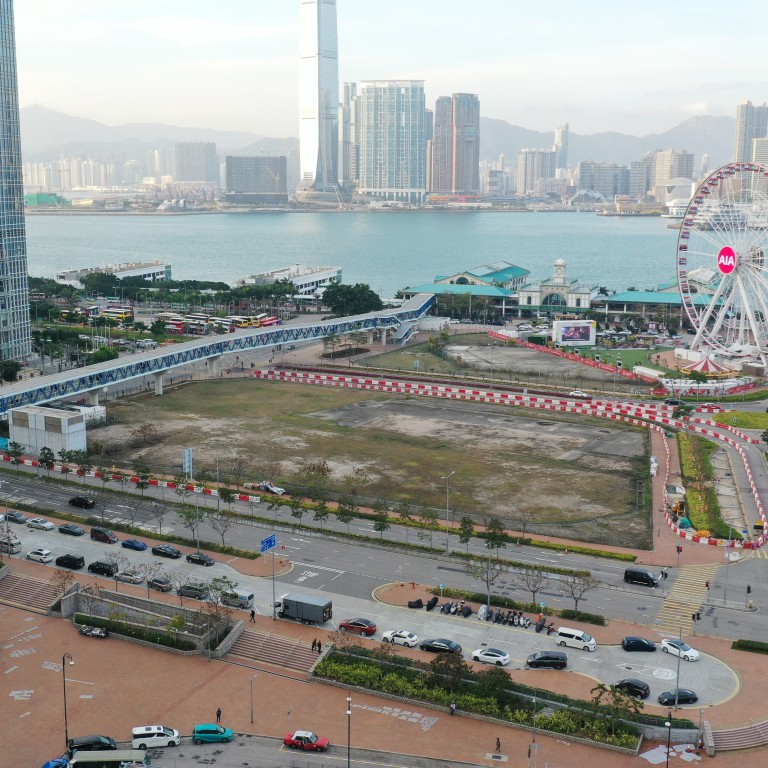
Record land sales will shrink Hong Kong deficit, but not enough to justify big spending, finance chief says
- The sale of several prime urban sites helped the city hit a record high of HK$40 billion as of last month, while brisk exports have also boosted recovery
- But land sale gains not enough to cover gap created by major jumps in recurrent spending over past five years, Paul Chan says
Hong Kong will run a smaller deficit than expected this financial year because of increased income from land sales, but it will not translate into major spending increases, the city’s finance chief said on Sunday.
Those sales fuelled confidence in the property markets which, in turn, prompted developers to pay a premium for development projects, he said.
“With the vibrant property and stock markets seen in the first half of the year, the stamp duties on property and share transfers have generated higher-than-expected revenue,” he wrote on his official blog on Sunday.
“It’s expected that the fiscal deficit for this financial year will be much smaller than the estimates we made at the beginning of this year.”

In his budget speech delivered in February, Chan forecast a record fiscal deficit of HK$101.6 billion, or 3.6 per cent of GDP, because of countercyclical fiscal measures and continued increases in recurrent expenditures.
But he called for prudence in light of the new-found market optimism, noting the past two decades had proved that land revenue in a specific year could be a less-than-effective indicator of future performance.
Chan said expenditures on medical and health, social welfare and education had already increased by 53 per cent, 62 per cent and 25 per cent over the past five years, with revenue during the same period far from equalling that growth.
While this year’s solid land revenue numbers could compensate in part, Chan said there was no guarantee the same kind of sales figures would be repeated.

The financial implication of certain long-term government initiatives – such as the widened HK$2 fare scheme for those aged between 60 and 64 – would only be reflected in the next financial year, he added.
Boosting recurrent expenditures on the basis of the recent land market boom would therefore represent a risk that could not be assessed, he concluded.
Chan, who is expected to deliver the final budget blueprint of his term next February, also argued that resources should be spent on initiatives that residents “could see, feel and be satisfied with”.
Hong Kong economy set to grow about 6.5 per cent in 2021 but not all benefiting
The government should also focus on promoting “common prosperity”, he said, using President Xi Jinping’s term for policy aimed at helping China’s lower-income residents share more fairly in the country’s economic success.
Political scientist Ivan Choy Chi-keung, of Chinese University, said it was too early to say if Chan’s approach to spending was at odds with that of Chief Executive Carrie Lam Cheng Yuet-ngor, who last month unveiled an ambitious plan to build a new metropolis near the border with mainland China.
Opinion: Pandemic’s dark clouds still cast a shadow over Hong Kong’s economy
Lam has predicted the Northern Metropolis, which will include existing towns in Tin Shui Wai, Yuen Long, Fanling and Sheung Shui as well as neighbouring rural areas and six new development zones, would ultimately house 2.5 million people and create up to 68,000 new innovation and technology sector jobs.
“The Northern Metropolis plan is still a castle in the sky at this moment. It remains uncertain how feasible the idea is and, in fact, no one knows how much the government is going to spend on it,” Choy said, noting Lam’s reluctance to put a price tag on the initiative.
Traditionally, officials responsible for the city’s finances have tended to be more conservative than others, including the chief executive, he added.
“It’s too early to say whether Lam and Chan are crossing fire in the run-up to the chief executive race,” Choy said.
The pair have both been tipped as potential candidates in the race for city leadership next March, but neither have yet revealed if they plan to run.

